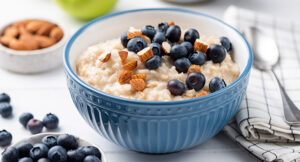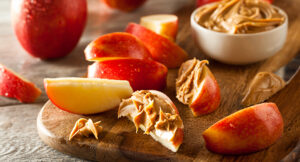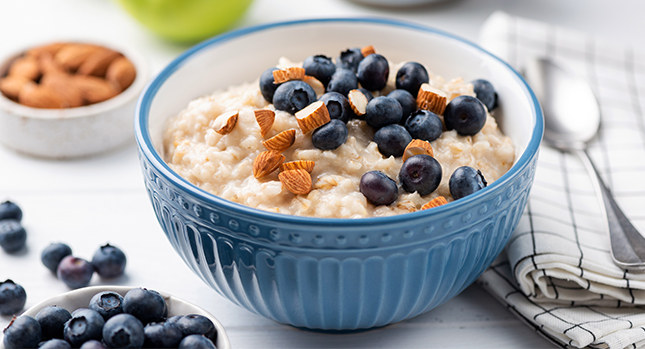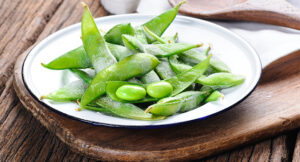With so many more kids at home all day, you’ve probably heard them call out “I’m hungry!” too many times. Children can sometimes mistake boredom for hunger, and they may not always crave the snacks that provide the nutrition they need. So it can be challenging to come up with healthy snacks that kids would enjoy. Not only that, kids (and adults, too) are going to snack on whatever is available around the house – and that provides parents with a great opportunity to promote nutritious habits.
It’s always funny to me when people ask what my kids ate when they were little. I’m sure many of them think that, because of the work I do, my kids must have been perfect eaters, or that I had some special tricks up my sleeve that made them beg for broccoli and other healthy foods.
Truth be told, my kids were no different from most other kids. They had their likes and dislikes and they needed frequent snacks to fuel their active and growing bodies. But there were several really healthy foods that they were almost always willing to eat. I just downplayed the “healthy” part, because once you tell kids something is “good for you,” that’s one of the surest paths to rejection.
If “out of sight is out of mind,” then keeping nutritious foods visibly and readily available can have the opposite effect. Simple things – a bowl of fresh fruit on the counter or a container of cut up veggies stashed front and center in the refrigerator next to a container of hummus dip – can encourage kids to grab these healthy, convenient snacks. And have kids help out with snack preparation – it’s almost a surefire way to ensure they’ll eat them.
Mix and Match These Healthy Snacks for the Whole Family
Here are some snack ideas that your kids, and you, will love:
A lot of kids fall short when it comes to meeting their calcium needs, and many don’t eat enough fruit, so smoothies can help fill both gaps. They’re quick and easy to make, and kids love to make their own. If you’ve got low-fat milk, protein powder, and some frozen fruit or bananas at hand, your kids can take it from there. To make them smoothies a bit more special over the holidays, kids can decorate the top with dash of cinnamon or cocoa powder or a sprinkle of toasted coconut.
- Oatmeal
Naturally rich in fiber and B vitamins, a bowl of oatmeal makes a great snack on a cold day. Try making it with nonfat milk or soy milk rather than water to boost calcium and protein. Then sweeten lightly and stir in some diced fruit like bananas or apples.

- Nut Butter on Crackers or Apple Slices
Even if your kids eat peanut butter sandwiches all the time, they’re still usually perfectly happy to eat peanut butter for a snack, too. You can try different nut butters, like almond or cashew, and then let kids spread it on whole-grain crackers, rice cakes or sliced apples.

- Edamame Soybeans
Drop 1 cup of frozen edamame soybeans (in the pod) into boiling water for a few minutes. Sprinkle with a little salt or soy sauce. They’re a great source of plant-based protein, and they’re fun to eat – maybe while watching your favorite holiday movie.
Instead of granola bars, which tend to be made mostly of refined carbohydrates and offer very little nutrition, look for protein bars that provide at least 5 grams of protein. Bars that include nuts, fruits and seeds will provide additional nutrition.
- English muffin pizza
A classic treat that kids love. Top split English muffins (preferably whole grain) with some prepared pizza sauce and mozzarella cheese, then toast until bubbly. This makes a well-balanced treat with a boost of Vitamin C from the tomato sauce.
And Don’t Forget the Water
Kids also need to stay well hydrated too. Plain water is great, but a small amount of flavor may actually encourage your kids to drink more. Make it interesting by adding chunks of fruit to amp up the taste. For special meals, you can do the same with sparkling water, which feels more festive.
 Susan Bowerman, M.S., R.D., CSSD, CSOWM, FAND, Sr. Director, Worldwide Nutrition Education and Training
Susan Bowerman, M.S., R.D., CSSD, CSOWM, FAND, Sr. Director, Worldwide Nutrition Education and Training
Susan Bowerman earned a B.S. in biology with distinction from the University of Colorado, and received her M.S. in food science and nutrition from Colorado State University. She is a registered dietitian, holds two board certifications from the Academy of Nutrition and Dietetics as a certified specialist in sports dietetics, and a certified specialist in obesity and weight management, and is a Fellow of the Academy.





